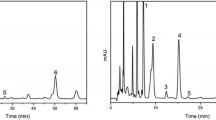Abstract.
Non-conventional seeds are of current interest because their constituents have unique chemical properties and they may augment the supply of edible oils. The study of seed oils for their minor constituents is useful in order to use both oil and the minor components effectively. Fat-soluble vitamins (FSV) and pro-vitamin A (β-carotene) are of particular importance in nutrition. Although fatty acid profiles of the selected seeds have been reported, no data about their FSV composition are yet available. Black cumin (Nigella sativa L.), coriander (Coriandrum sativum L.), and niger (Guizotia abyssinica Cass.) seed oils were extracted with two different solvents [n-hexane (H) or chloroform/methanol (CM) (2:1 v/v)] in a Soxhlet-extractor. An isocratic normal-phase high-performance liquid chromatography (NP-HPLC) method for FSV and β-carotene analysis using a Zorbax-Sil silica column and an ultraviolet (UV) detector was developed. Isooctane/ethylacetate (96:4 v/v) was used as the eluant for the simultaneous elution of vitamin E, while isooctane/2-propanol (99:1 v/v) was used to elute other FSV and β-carotene. Saponification of seed oil samples was not required. The seed oil or its diluted solution in the selected mobile phase was therefore directly injected onto the HPLC column. All tocopherol derivatives were identified in seed oil samples. The main constituents in black cumin and niger seed oils were α- and γ-tocopherols, whereas β-tocopherol (575–672 µg g–1 oil) was the major tocopherol in coriander seed oil. β-Carotene was measured in high levels in coriander seed oil (739–892 µg g–1 oil), followed by niger seed oil (574–702 µg g–1 oil) then black cumin (569–593 µg g–1 oil). Examined seed oils, especially niger seed oil, were characterized by high amounts of phylloquinone (>0.2% of oil content). Retinoic acid, vitamin A-alcohol, vitamin D (D2+D3), and menadione (vitamin K3) have not been detected in all oilseed samples. The aim of the present investigation was to estimate FSV and β-carotene content of studied oilseeds. The results obtained show that because of their specific FSV constitution, these seed oils are promising new oils.
Similar content being viewed by others
Author information
Authors and Affiliations
Additional information
Electronic Publication
Rights and permissions
About this article
Cite this article
Ramadan, M., Mörsel, JT. Direct isocratic normal-phase HPLC assay of fat-soluble vitamins and β-carotene in oilseeds. Eur Food Res Technol 214, 521–527 (2002). https://doi.org/10.1007/s00217-002-0511-4
Received:
Revised:
Issue Date:
DOI: https://doi.org/10.1007/s00217-002-0511-4




